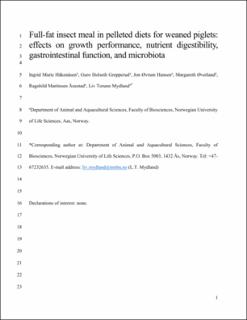Full-fat insect meal in pelleted diets for weaned piglets: Effects on growth performance, nutrient digestibility, gastrointestinal function, and microbiota
Håkenåsen, Ingrid Marie; Grepperud, Guro Holseth; Hansen, Jon Øvrum; Øverland, Margareth; Ånestad, Ragnhild; Mydland, Liv Torunn
Peer reviewed, Journal article
Accepted version
Permanent lenke
https://hdl.handle.net/11250/2826167Utgivelsesdato
2021Metadata
Vis full innførselSamlinger
Sammendrag
Insects, such as the black soldier fly larvae (BSFL), are suggested as a sustainable novel protein source for pigs. The BSFL contains chitin, medium-chain fatty acids, and antimicrobial peptides, which could improve the gastrointestinal function and health of the post-weaning pig. The objective of this study was to investigate the effect of increased inclusion of full-fat BSFL in diets for post-weaning pigs on growth performance parameters, digestibility of nutrients, gut morphology, and the microbial community in the colon. Eighty crossbred pigs were weaned at approximately 32 days of age, with an average weaning weight of 10.6 ± 0.8 kg. For four weeks, pigs were fed: a control diet or one of three diets containing increasing amount of full-fat BSFL meal at 4.76%, 9.52%, and 19.06%. The average daily gain (ADG) for the overall experimental period showed a negative cubic effect of dietary treatment, where the ADG was highest for pigs fed the control diet and lowest for pigs fed the diet with 4.76% BSFL (P = 0.031). Increased level of full-fat BSFL in the diet did not affect feed efficiency or fecal consistency. A linear reduction in the coefficient of apparent total tract digestibility (CATTD) of crude protein (P = 0.011) was found for increasing inclusion of BSFL, whereas for crude fat both the coefficient of apparent ileal digestibility (P = 0.043) and the CATTD (P < 0.001) increased linearly. Jejunal, ileal, or colonic morphometry was not affected by the BSFL inclusion. No differences in the short-chain fatty acid concentrations were detected among the dietary treatments, but a few minor changes in the colon microbiota were observed. At the phylum level, the colon microbiota was dominated by Bacteroidota and Firmicutes, but there was no clear pattern relationship with the BSFL inclusion level. At the genus level, the inclusion of BSFL in the diet reduced the relative abundance of Lactobacillus (P = 0.015) compared to the control. Collectively, the results indicate that up to 19.06% of full-fat BSFL meal could be included in a balanced diet for post-weaning pigs with only minor effects on growth performance, general gut function, and gut health.
